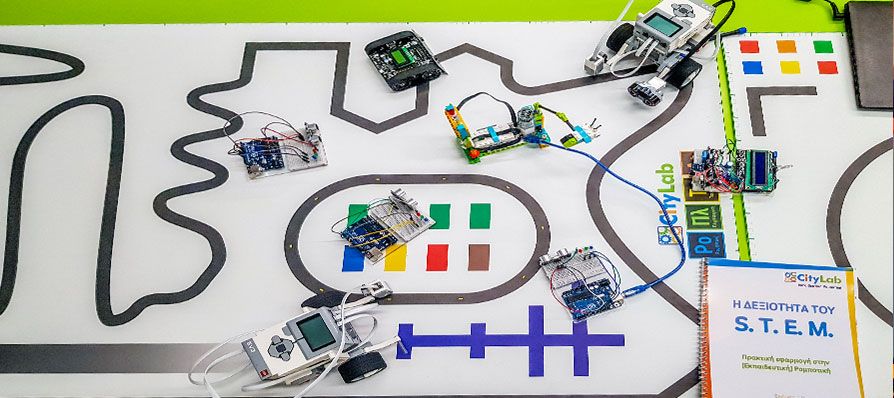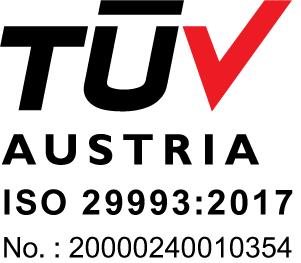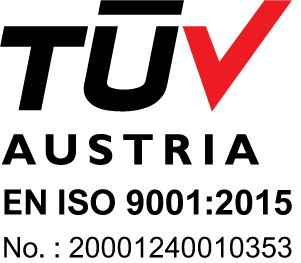Annual

Annual Workshops Program 2020 - 2021: 7 th year, 16 workshops!
In our 7th year of operation, we present 16 different laboratories.
Start of cycle 07/09/2020 , end of cycle 25/06/2021 , laboratories once a week in a lab lasting 90 ' .
Every lab, from our first day, includes theory, final design, creation and presentation to parents - according to the specifications of Educational Robotics.
The children, depending on their age, join the respective Laboratory and continue to the next year.
The children actively participate in high-standard workshops, where they design, program and build machines and robots, while in the next phase they move on to advanced electromechanical creations of artificial intelligence! This is the first step in their practical , creative and fun introduction to Science, Technology, Engineering and Mathematics (STEM).
Industries such as Finance, Mechatronics, AR / VR, Web Design supplement their knowledge with spectacular results and acceptance in areas that were considered "exclusively" for much older ages!
In the process, young and old discover many skills (cognitive and social) that they did not know that they have as they are converted from users to creators ! Finally, everyone has fun preparing for the complexity of the challenges that lie ahead , for jobs that do not exist today, but also for handling things that robots "will never do", such as creativity, interpersonal skills and solving original problems!
CityLab = Real World Robotics + STEM 360 ° + Soft Skills + Fun !!!
ANNUAL PROGRAM 2020-2021
| Ages | Laboratory | Monday | Tuesday | Wednesday | Thursday | Friday | Saturday |
|---|---|---|---|---|---|---|---|
| - MECHANICS | |||||||
| Ages | Laboratory | Monday | Tuesday | Wednesday | Thursday | Friday | Saturday |
| 5-7 | M_MSM | 17.00 | 17.30 | 17.00 | 10.00 | ||
| - ROBOTICS | |||||||
| Ages | Laboratory | Monday | Tuesday | Wednesday | Thursday | Friday | Saturday |
| 7−12 | R_WD | 17.30 | 17.30 | 19.30 | 10.00 | ||
| 7−12 | R_WD 2 | 19.00 | 17.30 | 17.30 | 17.30 | 12.00 | |
| 8−12 | P_SCR | 19.30 | 19.30 | 12.00 | |||
| 10+ | R_SPK | 19.30 | 17.30 | 14.00 | |||
| 10+ | R_EV3 | 19.00 | 19.00 | 10.00 | |||
| 11+ | R_EV3 (Adv.) | 19.00 | |||||
| - COMPUTER SCIENCE | |||||||
| Ages | Laboratory | Monday | Tuesday | Wednesday | Thursday | Friday | Saturday |
| 12+ | CS_C | 17.30 | |||||
| 12+ | CS_PYT | 19.30 | 12.00 | ||||
| 12+ | CS_PYT2 | 14.00 | |||||
| 12+ | CS_MOB | 19.30 | |||||
| - MECHATRONICS | |||||||
| Ages | Laboratory | Monday | Tuesday | Wednesday | Thursday | Friday | Saturday |
| 12+ | ARD | 19.30 | 12.00 | ||||
| 12+ | ARD (Adv.) | 19.30 | 14.00 | ||||
| - AUGMENTED / VIRTUAL REALITY | |||||||
| Ages | Laboratory | Monday | Tuesday | Wednesday | Thursday | Friday | Saturday |
| 12+ | AR / VR | 19.30 | |||||
| - WEB DESIGN | |||||||
| Ages | Laboratory | Monday | Tuesday | Wednesday | Thursday | Friday | Saturday |
| 12+ | WBD | 17.30 | |||||
| - FINANCIAL | |||||||
| Ages | Laboratory | Monday | Tuesday | Wednesday | Thursday | Friday | Saturday |
| 12+ | FIN | 19.00 | |||||
Topics per Laboratory
MECHANICS
We explore, understand, design, build and improve simple and complex machines. We use gears, wheels, axles, levers, pulleys but also concepts from Arithmetic and Geometry. We experiment and improve / transform them to solve new everyday problems. (M_MSM: Lego Simple Machines, More to Math etc.)
ROBOTICS
We design and build robots (machines that can and do interact with their environment) and develop their control software. We start with simple electromechanical models (7-12) and continue (10+) with a variety of rotation, sound, touch, light and light sensors. ultrasound. We use all areas of the STEM interdisciplinary approach, in interdisciplinary laboratories, with the aim and means of the Robot. We learn how to collect information from the environment and how to give feedback to our system. We measure time and distances in space, we learn about motion, randomness and variables, either by estimation or by size accuracy. ( R_WD: WeDo, R_WD2: WeDo 2.0,, P_SCR: SCRATCH, R_SPK: Spike Prime, R_EV3: EV3 Mindstorms, R_EV3 Advanced: EV3 Mindstorms)
COMPUTER SCIENCE
Introduction to the Science and Art of Computer Programming. Laboratories that teach algorithmic thinking and methodology for solving real (and original) problems with the aim of developing critical thinking, respecting the principles of Computer Science. Computational thinking, learning the structure of each language, writing and finally "coding" is a creative, enjoyable and natural consequence of mastering the previous skills. CS_C Language C, design and construction of classical algorithms from the beginning. CS_PYT: Object oriented programming in python. CS_PYT2: Advanced techniques and ready-made libraries. CS_MOB: MIT App Inventor for creating applications for mobiles and tablets.
Indicative Projects: C: "The Art of Computer Programming", AI, Game Theory, Classic Algorithms. Python: Space Invaders v2, Κρεμάλα v2, tic-tac-toe, Cryptography, Library. MIT App Inventor : Pet Robots, Arcade, Text to Speech, Platform Games, Puzzles.
MECHATRONICS
In a single electronic platform of processors, controllers, sensors and programming we create autonomous electromechanical constructions. Using sensors, the platform "understands" what is happening around it (movement, temperature, sound…) and converts it through the software into an instruction for (usually) movement of the robot, or rotation in motors, indications on screens and / or lights, etc. .a.The workshops are based on high level projects of real constructions. We use Arduino with a variety of sensors, resistors, capacitors, potentiometers, motors, motors, speakers, gears, shafts, monitors, led. We design electronic circuits (on paper or in software simulation environments), we add machines, sensors, components, cables, screws, led and lcd screens, we program and finallywe create real devices.
WEB DESIGN
Development of web pages and applications.
FINANCES
Financial education, necessary for our digital age - see the program and goals here .
Fields of STEM @ CityLab
- Science: Hypothesis and proof, Experimental design, Observation, prediction, data collection and interpretation, Time and speed distance measurements, Algorithms and Programming, ...
- Technology: Gears, movement, rotation, forces, color light and sound motion sensors, principles of assembly and construction of machines, ...
- Engineering: List of creative ideas, justification with data, analysis, correction, improvement, design, specifications, project management, writing instructions, research, presentation, ...
- Mathematics: Application of arithmetic, algebra and geometry in practice, statistical interpretation of experimental results ...
Teaching Objectives @ CityLab: Distinctive and specific for the Cognitive, Emotional and Psychomotor Area.
Educational Scenarios @ CityLab: ¨Coverage of goals from different Cognitive Areas, in weekly workshops lasting 90 '.
Everyday @ CityLab: We develop with STEM the means and fields of STEM, cognitive and social skills, having fun!
Children @ CityLab: They enter a world that pushes them to imagine and inspires them to create, right ?
Laboratory costs - Discounts
Payment is made on the first ten days of each current month by credit (POS), bank credit or cash.
Receipt or Service Invoice is issued.
- Discounts : 10% in a one-time advance payment of the annual laboratory cycle. 10% for siblings and / or second workshop of the same student.
See more about our labs per age here.








